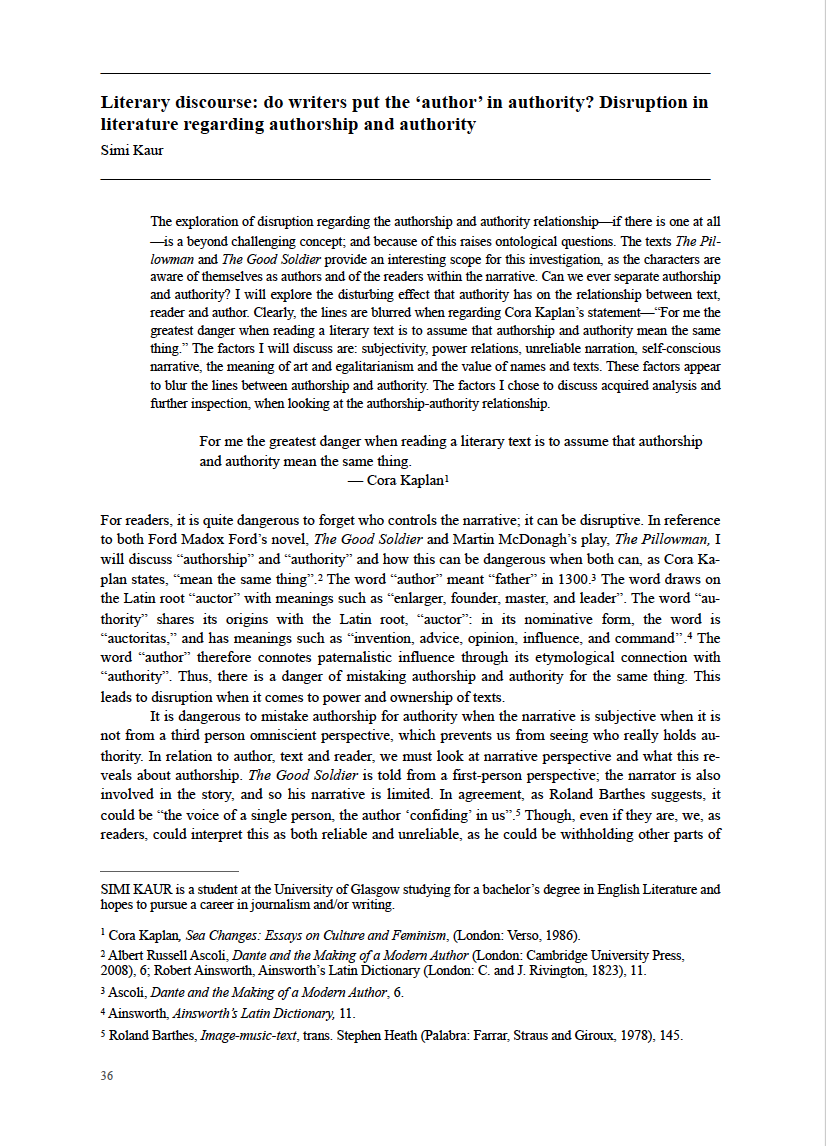Literary discourse
Do writers put the ‘author’ in authority? Disruption in literature regarding authorship and authority
DOI:
https://doi.org/10.36399/GroundingsUG.11.174Keywords:
Authorship, Authority, Disruption, Narrators, Death of the AuthorAbstract
The exploration of disruption regarding the authorship and authority relationship—if there is one at all —is a beyond challenging concept; and because of this raises ontological questions. The texts The Pillowman and The Good Soldier provide an interesting scope for this investigation, as the characters are aware of themselves as authors and of the readers within the narrative. Can we ever separate authorship and authority? I will explore the disturbing effect that authority has on the relationship between text, reader and author. Clearly, the lines are blurred when regarding Cora Kaplan’s statement—“For me the greatest danger when reading a literary text is to assume that authorship and authority mean the same thing.” The factors I will discuss are: subjectivity, power relations, unreliable narration, self-conscious narrative, the meaning of art and egalitarianism and the value of names and texts. These factors appear to blur the lines between authorship and authority. The factors I chose to discuss acquired analysis and further inspection, when looking at the authorship-authority relationship.
References
“Authorship.” Cambridge Dictionary. https://dictionary.cambridge.org/dictionary/english/authorship [accessed 14 February 2018]. “Authorship.” Oxford Dictionary. https://en.oxforddictionaries.com/definition/authorship [accessed 14 February 2018].
Ainsworth, Robert and Thomas Morell. Ainsworth’s Latin Dictionary. London: C. and J. Rivington, 1823.
Armstrong, Tim. Modernism: A Cultural History. Cambridge: Polity Press, 2005.
Ascoli, Albert Russell. Dante and the Making of a Modern Author. London: Cambridge University Press, 2008.
Barthes, Roland. “The Death of the Author.” In Image-music-text. Translated by Stephen Heath. Palabra: Farrar, Straus and Giroux, 1978.
Belsey, Catherine. “Writing About Desire.” The Glasgow Review, 1993–1996. https://www.gla.ac.uk/schools/critical/aboutus/resources/stella/projects/glasgowreview/iss ue2-belsey/.
Bennett, Andrew and Nicholas Royle. “The Author.” In An Introduction to Literature, Criticism and Theory, edited by Bennett and Royle, 18–27. United Kingdom: Pearson Education Limited, 1995.
Bonnycastle, Stephen. In Search of Authority. United Kingdom: NBN International, 1998.
Culler, Jonathan. Literary Theory: A Very Short Introduction. Oxford: Oxford University Press, 1997.
Ford, Ford Madox. The Good Soldier. London: Oxford Publications, 2012.
Foucault, Michel. 1997. “What is an Author?” In Language, Counter-Memory, Practice. Translated by Donald F. Bouchard and Sherry Simon, 124–127. New York: Cornell University Press, 1997.
Hampson, Roberts and Max Saunders. Ford Madox Ford’s Modernity. New York: Rodopi B.V., 2003.
McDonagh, Martin. The Pillowman. London: Faber and Faber Limited, 2003.
Olson, Greta. “Reconsidering Unreliability: Fallible and Untrustworthy Narrators.” Narrative 11, no. 1 (January 2003): 93–110.
Roberts, Mary Louise “Gender, Consumption, and Commodity Culture.” The American Historical Review 103, no. 3 (June 1998): 817–844.
Saussure, Ferdinand de. “The Linguistic Sign.” In The Cambridge Companion to Saussure, edited by Carol Sanders, 59–75. Cambridge: Cambridge University Press, 2004.
Waugh, Patricia. Modern Literary Theory: A reader. London: Edward Arnold, 1992.
Wilde, Oscar. “The Decay of Lying: An Observation”. In The Norton Anthology of Theory and Criticism, 2nd ed. New York: W. W. Norton & Company Inc, 2010.

Downloads
Published
Issue
Section
License
Copyright (c) 2018 Simi Kaur

This work is licensed under a Creative Commons Attribution 4.0 International License.
The CC BY 4.0 license is a Creative Commons license. This is a non-copyleft free license that is good for art and entertainment works, and educational works. It is compatible with all versions of the GNU GPL; however, like all CC licenses, it should not be used on software. People are free to: Share — copy and redistribute the material in any medium or format; Adapt — remix, transform, and build upon the material for any purpose, even commercially. The licensor cannot revoke these freedoms as long as you follow the license terms. But they must conform to the following terms: Attribution — You must give appropriate credit, provide a link to the license, and indicate if changes were made. You may do so in any reasonable manner, but not in any way that suggests the licensor endorses you or your use. No additional restrictions — You may not apply legal terms or technological measures that legally restrict others from doing anything the license permits.
Please check individual article PDF copies to see if any additional restrictions apply.







